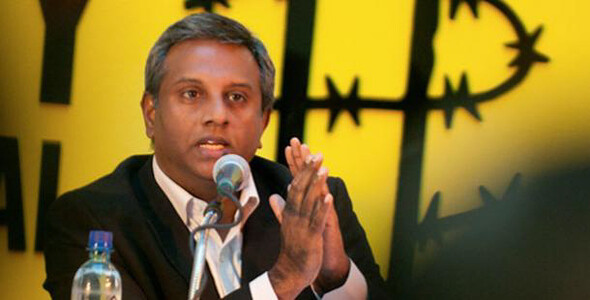hankyoreh
Links to other country sites 다른 나라 사이트 링크
Amnesty sends Pres. Park a letter over human rights

By Song Ho-kyun and Kim Hyo-jin, staff reporters
Amnesty International sent an official letter to President Park Geun-hye asking her to address violations of human rights in South Korea. The decision to send the letter just ahead of the first anniversary of Park taking office was seen by many as an unusual move.
The official letter from Amnesty International Secretary-General Salil Shetty was sent on Feb. 24. In it, Shetty asked the South Korean government to take action to resolve concerns about the human rights situation, adding that he looked forward to Park’s response.
The letter was address to Park at “1 Blue House Road, Jongno District, Seoul, Republic of Korea.”
The first issue mentioned in Shetty’s letter was South Korea’s National Security Law. Noting that Supreme Prosecutors’ Office data showed the number of people booked on violations of the law rose from 112 in 2012 to 129 in 2013, Shetty mentioned the rise in arrests and the ongoing request for a hearing to disband the Unified Progressive Party, currently mired in a scandal after lawmaker Lee Seok-ki was convicted of plotting insurrection.
“The South Korean government must guarantee the right to freedom of expression,” Shetty wrote.
Shetty also mentioned the suppression of organized labor.
“The right to freedom of association, and to form and join labor unions in particular, has been diminished,” he wrote, noting the South Korean government’s August 2013 rejection of an establishment notice for the Korean Government Employees’ Union and the decision to strip the Korean Teachers’ and Education Workers’ Union of its official status because it had members that were unemployed.
As a specific example, Shetty cited a Dec. 22 incident when police barged into the offices of the Korean Confederation of Trade Unions in central Seoul.
“Leaders in the Korean Railway Workers’ Union were arrested while attempting to exercise their rights, based on vague charges such as ‘obstruction of operations’ and violation of the Assembly and Demonstration Act,” Shetty wrote, adding that the International Labour Organization has “repeatedly recommended against criminal punishment of labor activists.”
Another topic mentioned in the letter had to do with infringements of residents’ rights in the erection of high-voltage electricity transmission towers in Miryang, South Gyeongsang Province.
“The residents affected most directly were effectively unable to participate in prior discussions of the transmission tower construction,” Shetty noted. “Residents have the right to know sufficiently and at an appropriate time what effects the transmission towers will have on their human rights. Independent and impartial assessments of human rights and environmental impact should be conducted, and the findings should be made public.”
Shetty went on to call for abolition of the death penalty, recognition of conscientious objection to military service, and guarantees on migrant worker rights.
“Amnesty International has traditionally sent letters when presidents are inaugurated in countries where there are human rights concerns,” explained Byun Jeong-pil, head of the campaign team for the organization’s South Korean chapter.
“In President Park’s case, they did not send a letter at the time of her inauguration,” Byun added. “They were not unconcerned, but they decided to wait and watch. The letter was sent after a year of monitoring convinced them that their fears about human rights issues in South Korea had been borne out.”
Please direct questions or comments to [english@hani.co.kr]

Editorial・opinion
![[Column] Has Korea, too, crossed the Rubicon on China? [Column] Has Korea, too, crossed the Rubicon on China?](https://flexible.img.hani.co.kr/flexible/normal/500/300/imgdb/original/2024/0419/9317135153409185.jpg) [Column] Has Korea, too, crossed the Rubicon on China?
[Column] Has Korea, too, crossed the Rubicon on China?![[Correspondent’s column] In Japan’s alliance with US, echoes of its past alliances with UK [Correspondent’s column] In Japan’s alliance with US, echoes of its past alliances with UK](https://flexible.img.hani.co.kr/flexible/normal/500/300/imgdb/original/2024/0419/2317135166563519.jpg) [Correspondent’s column] In Japan’s alliance with US, echoes of its past alliances with UK
[Correspondent’s column] In Japan’s alliance with US, echoes of its past alliances with UK- [Editorial] Does Yoon think the Korean public is wrong?
- [Editorial] As it bolsters its alliance with US, Japan must be accountable for past
- [Guest essay] Amending the Constitution is Yoon’s key to leaving office in public’s good graces
- [Editorial] 10 years on, lessons of Sewol tragedy must never be forgotten
- [Column] A death blow to Korea’s prosecutor politics
- [Correspondent’s column] The US and the end of Japanese pacifism
- [Guest essay] How Korea turned its trainee doctors into monsters
- [Guest essay] As someone who helped forge Seoul-Moscow ties, their status today troubles me
Most viewed articles
- 1[Column] The clock is ticking for Korea’s first lady
- 2Samsung barricades office as unionized workers strike for better conditions
- 3[Editorial] When the choice is kids or career, Korea will never overcome birth rate woes
- 4[News analysis] After elections, prosecutorial reform will likely make legislative agenda
- 5S. Korea, Japan reaffirm commitment to strengthening trilateral ties with US
- 6All eyes on Xiaomi after it pulls off EV that Apple couldn’t
- 7After 2 months of delayed, denied medical care, Koreans worry worst may be yet to come
- 8US overtakes China as Korea’s top export market, prompting trade sanction jitters
- 9[Column] Has Korea, too, crossed the Rubicon on China?
- 10Hong Se-hwa, voice for tolerance whose memoir of exile touched a chord, dies at 76